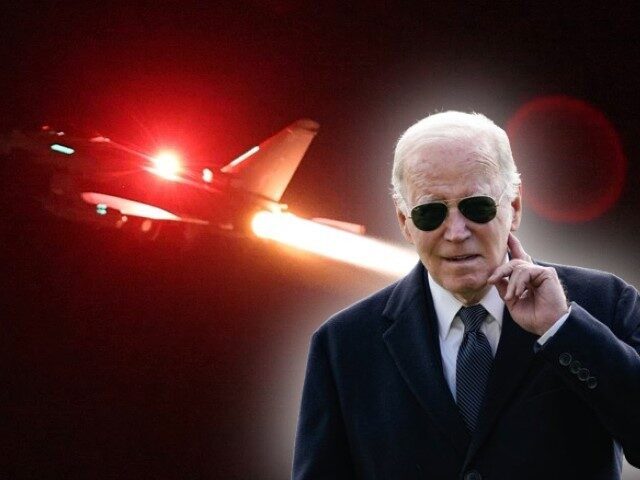U.S. Central Command (CENTCOM) on Wednesday announced American forces conducted airstrikes against Kataib Hezbollah (KH), one of the largest and most aggressive Iran-backed Shiite militia groups in Iraq.
The strikes were a response to KH attacks against U.S. forces in Iraq, but the Iraqi government denounced them as American “acts of aggression.”
CENTCOM said the strikes against “KH headquarters, storage, and training locations for rocket, missile, and one-way attack UAV capabilities” were a response to attacks by the Shiite militia, including their January 20 assault on al-Asad Airbase in western Iraq.
Secretary of Defense Lloyd Austin described the strikes as “necessary and proportionate” in a statement on Tuesday.
“We do not seek to escalate conflict in the region. We are fully prepared to take further measures to protect our people and our facilities. We call on these groups and their Iranian sponsors to immediately cease these attacks,” Austin said.
Iraqi officials said two people were killed and two more wounded in Wednesday’s U.S. airstrikes.
The January 20 rocket and missile attack on al-Asad was the latest in a series of provocations by Iranian proxies since Hamas attacked Israel on October 7. As with most of the terror strikes in Iraq, responsibility for the latest assault on al-Asad was claimed by the “Islamic Resistance in Iraq” (IRI), an umbrella organization of Iran-backed militias.
Most of the previous militia attacks were intercepted by U.S. forces with minimal damage and casualties, but the Pentagon said some missiles from the latest barrage were able to penetrate air defenses and cause unspecified damage to the al-Asad base. Several U.S. military personnel, plus at least one Iraqi service member, were injured.
Iraqi armed forces spokesman Maj. Gen. Yehia Rasool rejected the statements by CENTCOM and Austin, denouncing the U.S. airstrikes as a violation of Iraqi sovereignty.
“We will treat these operations as acts of aggression and take necessary actions to preserve the lives and dignity of Iraqis on their land that became safe and stable due to the sacrifices of our people,” Rasool declared on Wednesday.
“While positive steps have been taken to reshape the future relationship and missions of the Coalition members and advisors in Iraq, the recent actions are hindering this progress, undermining agreements and various sectors of joint security cooperation,” he said, referring to the awkward dispute between Prime Minister Mohammed Shia al-Sudani and the Pentagon over when U.S. troops might withdraw from Iraq.
Rasool accused the U.S. and its allies of ignoring “the immoral war of extermination faced by the Palestinian people.” Iran’s proxy forces in Iraq are ostensibly attacking U.S. positions to pressure Israel into halting its war against the Hamas terrorists in Gaza.
“While the major powers, including the United States, remained silent regarding these crimes, we see the United States sliding into condemnable and unjustified aggressive actions against Iraqi territory and national sovereignty,” Rasool said.
Sudani’s national security adviser, Qassem al-Araji, echoed Rasool’s remarks on Wednesday by calling the U.S. airstrikes a “flagrant violation of Iraq’s sovereignty” that “do not help bring calm.”
“The U.S. side should pile on pressure for a halt to the offensive in Gaza, rather than targeting and bombing the bases of an Iraqi national body,” Araji said.
The Biden administration pleaded ineffectually with Sudani and his government to restrain the Shiite militia forces, which were nominally deputized into the Iraqi military as “Popular Mobilization Forces”(PMF) several years ago to fight the Islamic State invasion.
Despite this fiction of legitimacy, everyone knows the PMF militia take their orders from Tehran, not Baghdad, and Iran has a great deal of political sway over large parts of Iraq. Sudani unsurprisingly decided the real menace to stability in Iraq was the U.S. military. His government took the official position that only ending Israel’s war against Hamas in Gaza will put a stop to Shiite militia attacks in Iraq – much as China and other allies of Iran claim that only capitulating to Tehran’s proxies in Yemen, the Houthis, can halt their attacks on Red Sea shipping.
Kataib Hezbollah, the target named by CENTCOM for its strikes, is one of the most powerful Iran-backed Shiite militias. KH was working closely with Iranian terror master Gen. Qassem Soleimani to attack American positions in Iraq when Soleimani was liquidated by a U.S. airstrike in January 2020. KH founder Abu Mahdi al-Muhandis was killed along with Soleimani in the strike.

COMMENTS
Please let us know if you're having issues with commenting.